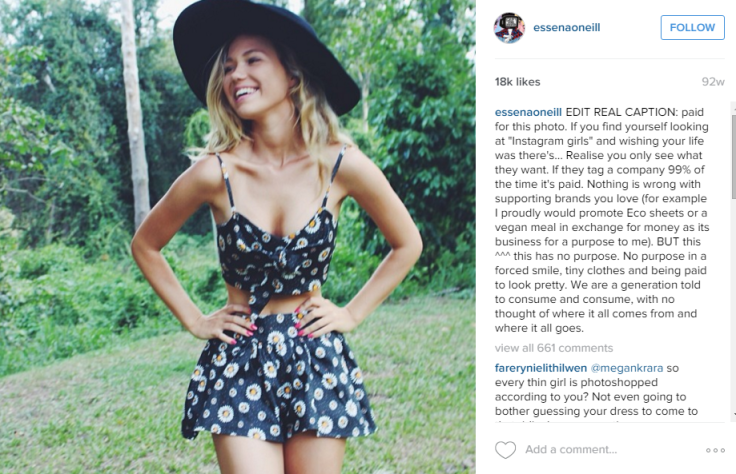It Was A 'Perfect Life' On Social Media, But 18-Year-Old Instagram Star Says She Was 'Addicted, Miserable'

If you grew up in the aughts, you probably had a Myspace and AIM, already learning how to navigate the budding world of social media. Today, social media has ballooned and developed to become so pervasive — so persistent and relentless — in our lives, that for many people it’s nearly impossible to extricate the “irl” (in real life) from their Internet personality and presence.
One 18-year-old girl from the Sunshine Coast in Australia is now making a big wave about the drawbacks and downfalls of social media. Ironically, she’s doing it all on social media, helped (and inspired by) the fact that she had built an Instagram empire of thousands of followers over the course of several years.
A quick look at some of Essena O’Neill’s Instagram pictures might make it seem as though the pretty, thin, blonde Australian has the perfect life. Clad in fashionable clothes, with flawlessly-applied makeup, O’Neill’s selfies are nearly perfect. Yet we’ve seen it all before — all the girls who look like they have cooler lives than you on Facebook or Instagram or Tumblr all seem to have the same cookie-cutter types of posts. Eating brunch in a cute dress and hat. Standing on top of a mountain with perfect hair, paired with some inspirational quote about exploration and authenticity. Doing a zen yoga pose on the beach with a toned body. Life looks cool under filters, probably after taking 60 selfies to get the right one to hide the blemishes, acne, wrinkles — and utter sadness.
Social media isn’t real — that’s O’Neill’s message to young people, after spending years “wasting” her life trying to feel validated online. “I fell in love with this idea that I could be of value to other people,” she writes. “Let’s call this my snowballing addiction to be liked by others.”
That addiction fueled depression and an even greater loss of sense of self-worth, despite the fact that she had more than half a million followers on Instagram and 250,000 YouTube subscribers. Over time, she received offers from modeling agencies and sponsorships — and soon was able to support herself off the money earned from marketing items like dresses, bikinis, and even tea on Instagram.
After her addiction came to a head, however, O’Neill decided to make a drastic change. This week, she has deleted thousands of her photos and several of her social media accounts to change the way she interacts with the real world — and with herself. She’s left several photos on her Instagram, however, with edited captions, hoping to prove to other young people that the Photoshopped, intricately-planned photos are all fake.
“Stomach sucked in, strategic pose, pushed up boobs,” she writes. “I just want younger girls to know this isn’t candid life, or cool or inspirational. It’s contrived perfection made to get attention.”
While social media certainly has its benefits — and can be used to enhance personal relationships — research has also shown that it can have deeply negative effects on mental health. On recent study found that Facebook addiction activates the same part of your brain that drug addiction impacts. There are even conventions and new therapies developed specifically to treat social media addiction — like Talkspace, which aims to reduce mental health problems associated with social media.
“We’re not saying social media is a bad thing,” Frank told Medical Daily. “However, the overconsumption of social media creates addictive qualities and patterns of use that are just unhealthy. They promote poor mental health and poor self-image, anxiety, depression, narcissism, and even eating disorders.”
Perhaps O’Neill’s drastic change is a wake-up call for everyone out there — whether you dabble in social media with detachment, or you’re an Internet kid glued to your phone and Tumblr, ravenous for the perfect selfie and the 11th like.
“I spent every day looking at a screen, viewing and comparing myself to others,” O’Neill wrote. “It’s easier to look at shiny and pretty things that appear happy than stopping and just getting real with yourself.”



























